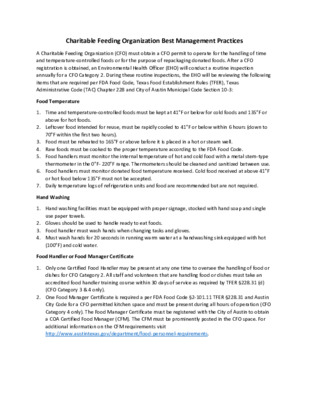Backup_ATCFPB_CFO Best Mgmt Practices — original pdf
Backup

Charitable Feeding Organization Best Management Practices A Charitable Feeding Organization (CFO) must obtain a CFO permit to operate for the handling of time and temperature-controlled foods or for the purpose of repackaging donated foods. After a CFO registration is obtained, an Environmental Health Officer (EHO) will conduct a routine inspection annually for a CFO Category 2. During these routine inspections, the EHO will be reviewing the following items that are required per FDA Food Code, Texas Food Establishment Rules (TFER), Texas Administrative Code (TAC) Chapter 228 and City of Austin Municipal Code Section 10-3: Food Temperature above for hot foods. 70°F within the first two hours). 1. Time and temperature-controlled foods must be kept at 41°F or below for cold foods and 135°F or 2. Leftover food intended for reuse, must be rapidly cooled to 41°F or below within 6 hours (down to 3. Food must be reheated to 165°F or above before it is placed in a hot or steam well. 4. Raw foods must be cooked to the proper temperature according to the FDA Food Code. 5. Food handlers must monitor the internal temperature of hot and cold food with a metal stem-type thermometer in the 0°F- 220°F range. Thermometers should be cleaned and sanitized between use. 6. Food handlers must monitor donated food temperature received. Cold food received at above 41°F or hot food below 135°F must not be accepted. 7. Daily temperature logs of refrigeration units and food are recommended but are not required. Hand Washing use paper towels. 1. Hand washing facilities must be equipped with proper signage, stocked with hand soap and single 2. Gloves should be used to handle ready to eat foods. 3. Food handler must wash hands when changing tasks and gloves. 4. Must wash hands for 20 seconds in running warm water at a handwashing sink equipped with hot (100°F) and cold water. Food Handler or Food Manager Certificate 1. Only one Certified Food Handler may be present at any one time to oversee the handling of food or dishes for CFO Category 2. All staff and volunteers that are handling food or dishes must take an accredited food handler training course within 30 days of service as required by TFER §228.31 (d) (CFO Category 3 & 4 only). 2. One Food Manager Certificate is required a per FDA Food Code §2-101.11 TFER §228.31 and Austin City Code for a CFO permitted kitchen space and must be present during all hours of operation (CFO Category 4 only). The Food Manager Certificate must be registered with the City of Austin to obtain a COA Certified Food Manager (CFM). The CFM must be prominently posted in the CFO space. For additional information on the CFM requirements visit http://www.austintexas.gov/department/food-personnel-requirements. Dish Washing Station 1. The 2 or 3 compartment sinks are to be designated for dishwashing only. If sinks will be used for food preparation purposes, the basins must be washed, rinsed and sanitized before using for food preparation. 2. Sinks used for dish washing must be equipped with running hot water at 110°F and cold water. 3. The 3 compartment or 2 compartment sinks must not be used for handwashing or for dumping dirty water. 4. Dishes must be washed in the following order: wash (with soapy water), rinse with water, sanitize and air dry on rack. To make sanitizer solution, use 1 ½ teaspoons of plain bleach per gallon of clean water. 5. Sanitizer test strips must be provided at dish sink to test sanitizer solution (Chlorine/Quaternary solution). Sanitizer concentration level shall be kept between 50-100 ppm chlorine. 6. Sanitizer solution may be used in spray bottles to sanitize counters and other food contact surfaces. Food Handling 1. Gloves should be used to handle ready to eat foods. 2. All food and dishes must be kept covered to protect food from exposure to potential contaminants. 3. Repackaging food must be done on a clean food contact surface. Food must be labeled with food item name, list of ingredients and information on where the item was prepared or manufactured. 4. Food handler must use the first in first out (FIFO) method for food products including canned goods. 5. Prepared foods should be labeled with a date mark or when the food was prepared and discard date. The discard date is seven (days) past preparation. Day one (1) is the date of preparation. 6. Raw meats and eggs should be stored below ready-to-eat foods (milk, cheese, fruits, etc.). 7. Thaw foods by placing food in a container to leave in the refrigerator overnight or by placing them under cold running water until thawed. Monitor food temperature and avoid food reaching a temperature above 41°F. 8. All donated food must be from an approved source or permitted kitchen. No home prepared foods 9. Containers used to store food must be food grade and labeled. 10. All chemicals must be labeled and stored in a separately designated area away from food or food allowed. contact surfaces. Cleanliness premises. Specialized Processes 1. The space must be maintained clean and free of food particles or debris. 2. Daily cleaning logs are recommended but are not required. 3. The CFO storage or kitchen space shall provide pest control to eliminate their presence on the If you are using a Reduced Oxygen Packaging machine, using additives to preserve food or using additional specialized processes to prepare food; a Hazard Analysis Critical Control Point (HACCP) plan must be submitted for review with HACCP@austintexas.gov .